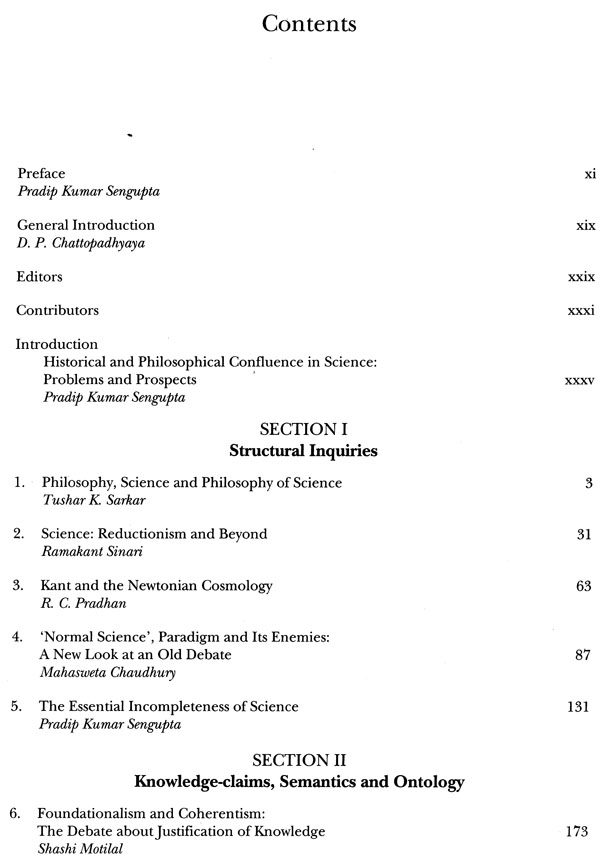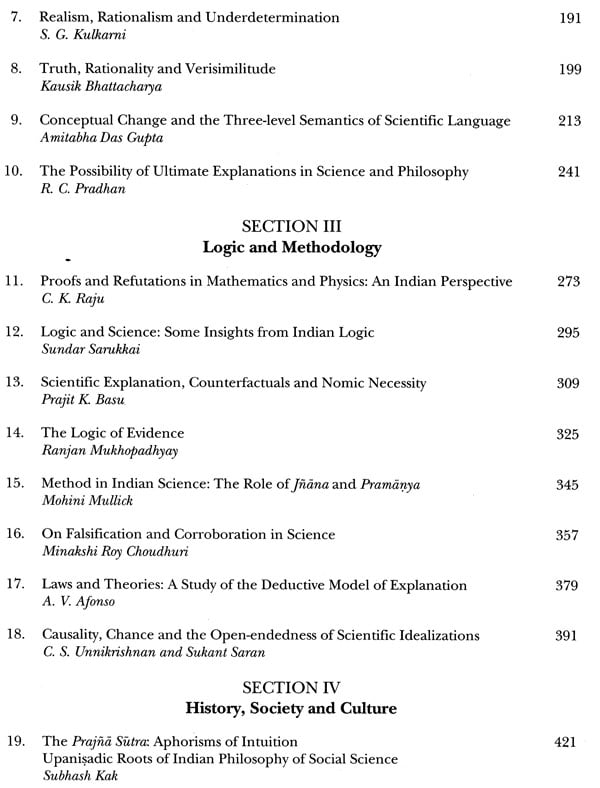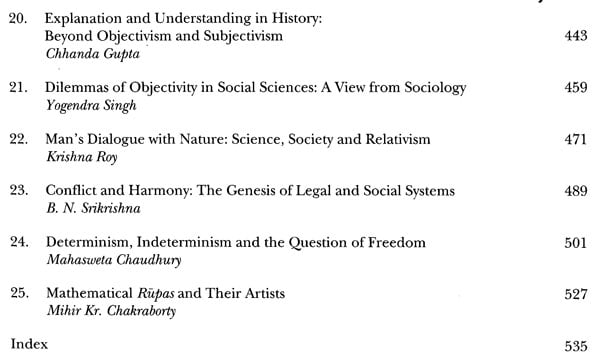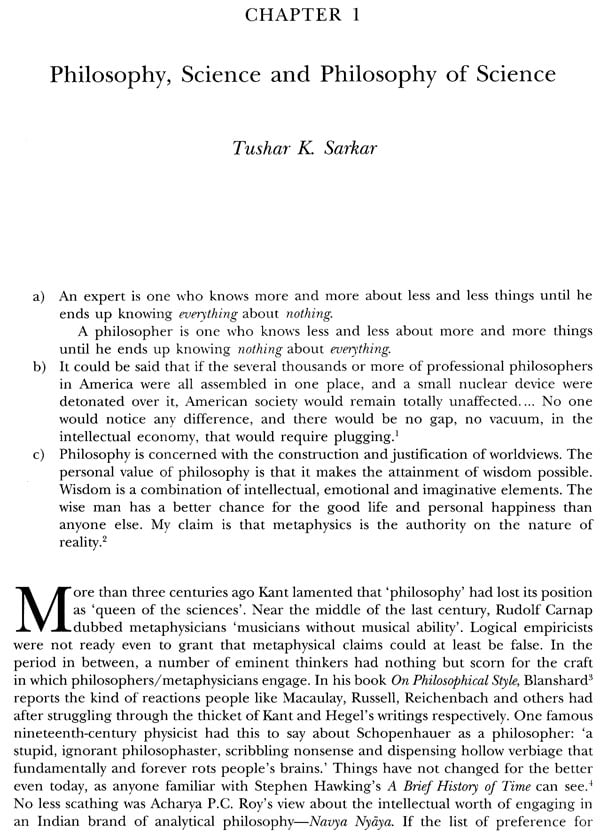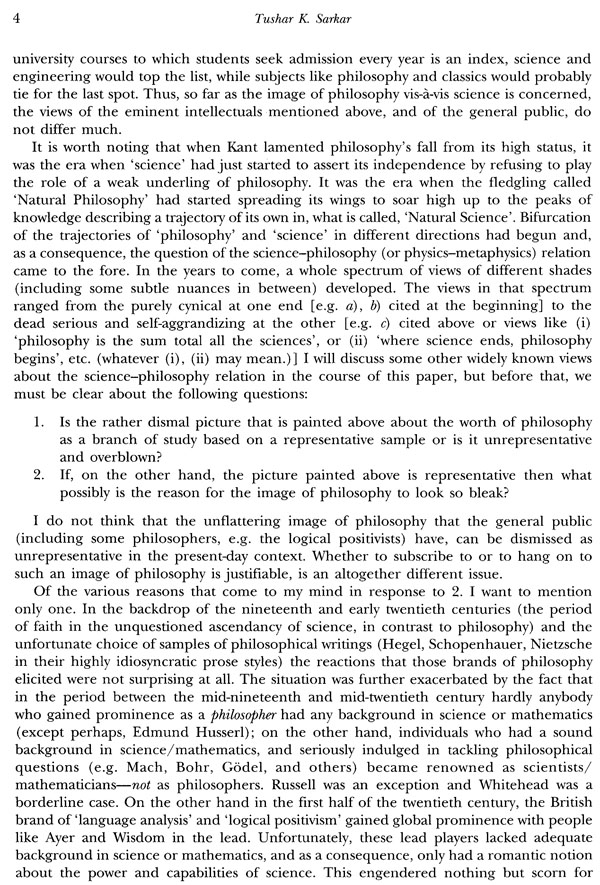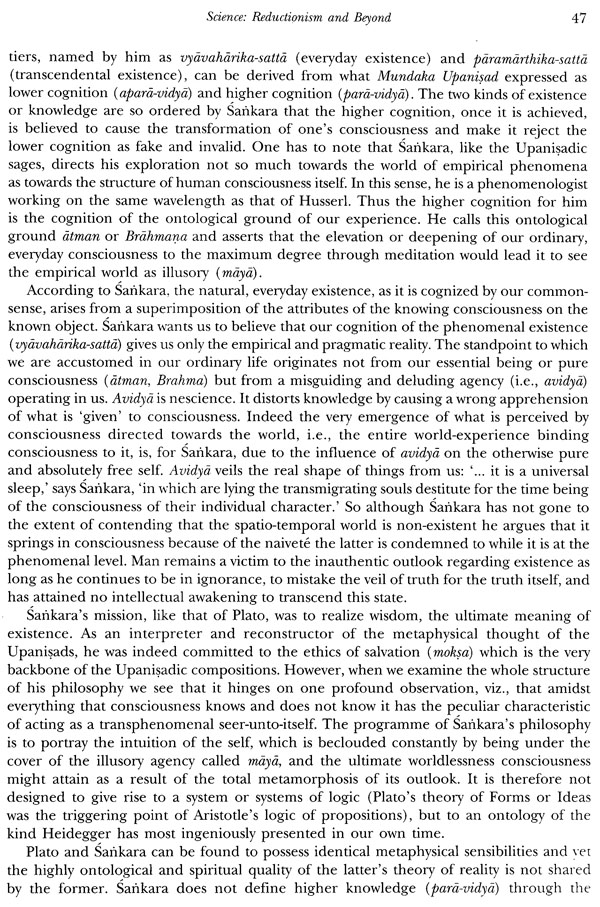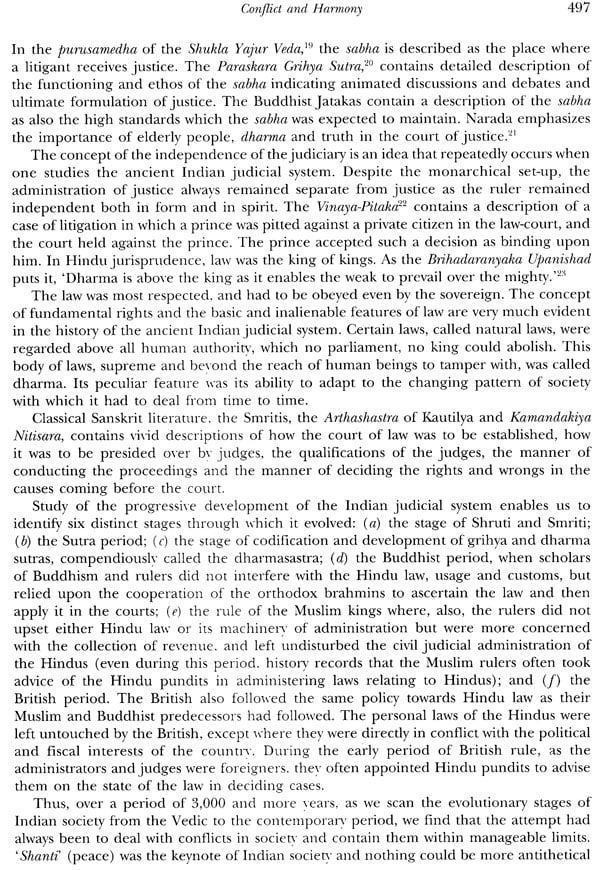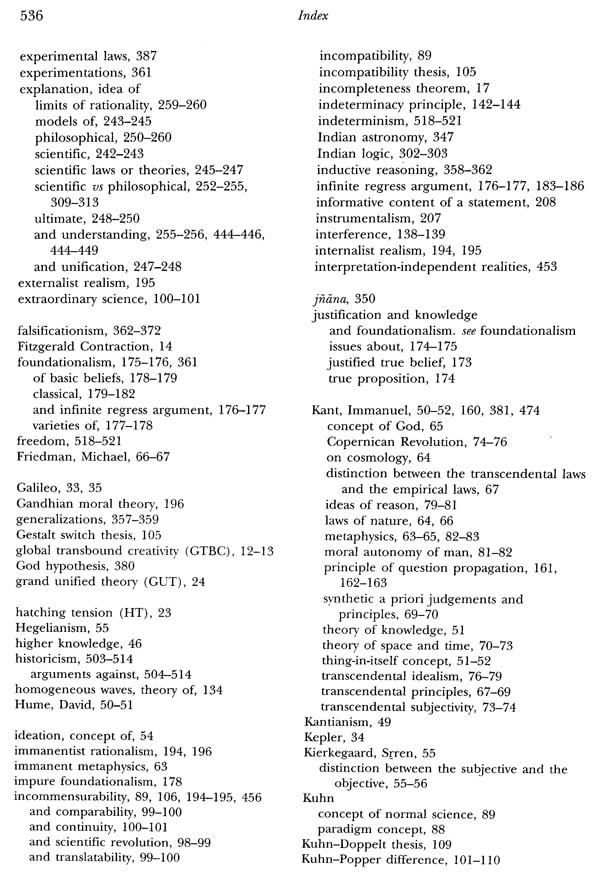
A Philosophical Perspective of the Logic of Ideas in Science (History of Science, Philosophy and Culture in Indian Civilization)
Book Specification
| Item Code: | NAW755 |
| Author: | D.P. Chattopadhyaya & Pradip Kumar Sengupta |
| Publisher: | Center for Studies in Civilizations |
| Language: | English |
| Edition: | 2012 |
| ISBN: | 9788131719312 |
| Pages: | 600 |
| Cover: | HARDCOVER |
| Other Details | 11.50 X 9.00 inch |
| Weight | 1.88 kg |
Book Description
The history of science and philosophy of science, seemingly two different disciplines of study, are in fact closely linked. The history of science is concerned mainly with the historical analysis of scientific ideas, refined by suitable modifications in subsequent periods. The philosophy of science teaches us that science does not give us the final truth and that it makes mistakes. What science propounds is, in principle, replaceable. History of Science and Philosophy of Science, a primarily interdisciplinary study, deals with the historical and philosophical perspectives of science and explores the mutuality of the relations between the two disciplines. To present the study in a reader-friendly format, it has been divided into two parts, with the first volume (Part 6) dedicated to the 'history' of science and the second volume (Part 7) to the 'philosophy' of science.
History of Science and Philosophy of Science: A Philosophical Perspective of the Logic of Ideas in Science, the second part of Volume XIII, tries to explain how science is an open-ended quest where man continually uses his logic and critical thinking faculties to arrive at better results, which are in turn subject to further revision. The main focus of this part is directed to the procedures and results of the natural sciences, particularly physics. It also includes essays on sociology, history and other allied disciplines covering the legal, moral and aesthetic aspects of science. This part seeks to address the basic question about the logically structured character of scientific knowledge, its evolutionary strength for survival and its methodological adequacy. The ultimate aim is to understand how and why the universe exists as it does, and what role humans play in their daily interactions with it.
Written in simplified language, with elaborate explanations and discussions tracing out ideas and arguments, these volumes will interest and engage both researchers and well-informed general readers.
Pradip Kumar Sengupta, P.R.S., Ph.D., was Professor and Head, Department of Philosophy and Comparative Religion; and Coordinator, Special Assistance Programmed (UGC), Visva-Bharati. The broad areas of his research interest are philosophy of science and philosophy of logic. He was associated with the University of Oxford and the London School of Economics, for higher research. He was UGC National Lecturer and a Senior Fellow, Indian Council of Philosophical Research (ICPR), New Delhi. He has studied Indian musicology and contributes regularly to the journal Sangeet Research Academy, Kolkata. Among the works authored edited by him are The Logical Structure of Science (1970); Anumiti Pariksha (in Bengali) (1978); Freedom, Transcendence and Identity (1988); Foundations of Indian Musicology (1991); The Philosophy of Swami Vivekananda (1995); Science, Language and Creativity (1995); and Prabas Jivan Chaudhury on Multi-Aspects of Philosophy (2003). He has also published numerous papers in leading journals and anthologies.
The Philosophy Volume XIII History of Science and Philosophy of Science were initially planned as one book. It was designed to appear as an integrated study dealing with the historical and philosophical perspectives of science. But, it was later decided to divide it into two parts, the first (Part 6) dealing with the 'history of science' and the second (Part 7) with the philosophy of science. This was done to have the volume in a reader-friendly format, which would not be too fat in size. Contributions in both the parts are self-contained, and the readers will have no difficulty in proceeding with the materials which are presented as independent essays. However, for the benefit of the readers, it is advised that they go through both the parts together, because it is believed that the history of science without the philosophy of science is short-sighted, if not blind; and the philosophy of science without the history of science is empty of content.
The main focus of Part 7 of this volume is directed to the procedures and results of the natural sciences, particularly physics. But it also includes essays on sociology, history and other allied disciplines covering the legal, moral and aesthetic aspects of science. Both parts of this volume together attempt to work out the historical growth and the philosophical foundation of the various branches of study which can broadly be considered relevant in any major research work under the term 'scientific culture'. Each of the two parts has been enriched respectively by contributions from distinguished scientists and philosophers living in India and abroad. This work, with both its parts, presents an analytical survey of the historical and philosophical dimensions of science across national boundaries in a language which is fairly non-technical. It will be of interest to researchers and well-informed scholars who are not necessarily specialists. Some authors have devoted their work exclusively to the study of ancient Indian culture in exploring the ideas relevant to science, while others have worked out the growing scientific ideas of the West. Some essays, however, are intended to be a comparative study of the Indian and Western thoughts. Philosophy of science teaches us that science does not give us the final truth and that it makes mistakes. What science propounds is, in principle, replaceable. It is characterized by a sort of survival benefit for the time being. The essentials of philosophy of science may be said to consist of finding out a problem situation and its possible solution which again, in its turn, does give rise to another problem situation. The mutuality and interdependence of history of science and philosophy of science have been explained in a brief outline in the introductory essay titled 'Historical and Philosophical Confluence in Science: Problems and Prospects'. In my capacity as the editorial fellow, I consider it my duty to get the readers familiar with the thematic exploration undertaken in this work. I have tried to work out a rough sketch of what can be said to be the meeting point of the history of scientific ideas and the logic of scientific ideas. I have tried to argue that though they are meant for different functions, each one is indispensable to the other. History of science, as a professional discipline, started in the 1950s, primarily in the United States. On the other hand, philosophy of science, as a professional discipline, is much older having its roots in the works of Aristotle .General historians do not consider the history of science to be a subject falling within their domain. One may, however, notice that the philosophy of science has been pursued by professional philosophers; but scientists in their active professional career have seldom shown any major interest in issues relating to the history of science. It has been argued that historians of science are supposed to work out the history of scientific ideas particularly with a view to addressing questions of a philosophical nature. The form of the history of science, as shaped by what is called the internal approach; is concerned with the intellectual substance of science as a special kind of knowledge. It has its rival, shaped by the external approach, which is concerned with the activities of the scientists as a social group within a larger culture. The proper approach is, however, to put together these two aspects and to consider the history of science as both internal and external. Philosophers of science, in addition to their pursuit of the critical evaluation of scientific procedures, have to take into account the historical particulars and the evolution of scientific ideas and concepts. Philosophy of Science, as presented here (Part 7), upholds that scientific results are provisional. There cannot be any claim of absolute certainty which might be convincing to mankind forever. This would result in a complete deadlock of the ever-progressing human civilization. As man grows, so grows his civilization, and his ideas; and man is never satisfied with the present. He is always in search of a better and more refined future, rationally and critically reconstructed. Science thus remains an open-ended quest which is indicative of the free intellectual drive of man, unfettered by any pedantry. The rational-reconstruction view of the philosophy of science is upheld by Proper. Kuhn is no less concerned with this view but, unlike Popper, he begins as a historian of science, examining closely the facts of scientific life and the process of scientific behavior in a social context. He emphasizes the revolutionary process by which the older is rejected and replaced by an incompatible new one. Kuhn, like Popper, argues in favor of the intimate and inevitable entanglement of scientific observation with scientific theory.
It is roughly with this idea in the background that the thrust areas in this part seek to address the basic question about the logically structured character of scientific knowledge, its evolutionary strength for survival and its methodological adequacy. Philosophy of science, in distinguishing genuine science from pseudo-science, is concerned with exploring the nature of the empirical content, subject to proper confirmation or corroboration, of scientific hypotheses. It analyses the semantic character of the language, including its ontological bearings, in which scientific theories are formulated. Science is taken here in a broad sense including cosmology, physics, mathematics, sociology, history, law, ethics and also aesthetics. Since there are different ways of philosophizing, there cannot be any unique and universal philosophy of science. It is said that there is no method peculiar to philosophy and the philosophers are as free as others to use any method in searching for truth. In its search for a better and more comprehensive truth, the output of a philosophy of science may be characterized as a variety of realism. But the course of actual practice in science provides us with no more than the best approximate estimate of truth. The only unproblematic ally available sort of scientific realism is consequently one that has to be placed at the ideal state of science. Scientific truths, therefore, are to be regarded as idealizations. They are specifically useful for our constructive and creative directions in future.
Pradip Kumar Sengupta
PROLOGUE
The history of science and the philosophy of science are both concerned with what is essentially the same thing, namely, science. The history of science by itself does not have as rich an ancestry as the philosophy of science has. Neither the scientists, nor the philosophers themselves are always good historians in their professional career. But both the history of science and the philosophy of science are said to have long genealogies as academic specialties. Both the historian and the philosopher of science share a common allegiance to science, and it is debatable how many of the pioneers in this field came from their active career in science. History of science is not being usually pursued by professional historians who, however, do not have any adverse effect on this discipline. The philosophy of science, on the other hand, has been pursued by professional philosophers, and sometimes even by professional scientists. It may, however, be recalled that some great scientists (particularly Ernst Mach and Pierre Durham), in the course of their professional pursuit of science, have shown effective interest in working out a history of science which had enough relevance in their own times. To this point, we shall come later. Specialists in history of science and philosophy of science might have some scientific training through academic discussions, but few have had the first-hand experience of research under laboratory conditions or have formal training in the creative aspect of theory construction. Some of the present-day universities in India may be said to have an independent academic course in the history of philosophy, but it is very doubtful if a similar course in the history of science is ever encouraged by the university authorities. From science we learnt, as contrary to our first experience, that the sun does not go round the earth each day. Thus science, in most of the cases, appears to turn the table of our common sense approach. History of science specially points out that the adventure of science overturns the whole track of our everyday experience. But we must be on our guard, since too radical a correction of common sense by science may run the risk of depriving scientific theories of the ultimately common sense evidential basis on which Pradip Kumar Sengupta they have to depend as their sole safety and security ground. It would be safer to regard science as offering highly abstract, but effective theories, from the richness of our experience and imagination, rather than as the only truth at the cost of common sense. It should not be lost into a metaphysical slumber or an imaginary fiction. The ongoing professional research in history of science has obvious and urgent needs of effective tools and of analytical methods possessing demonstrative worth. It is perhaps for this reason, it is said, that the history of science is myopic, if not blind, without the help of the philosophy of science, which lays special stress on the intellectually systematic presentation of scientific discoveries. Philosophers of science generally trace their roots to Aristotle's Analytical Posteriori, which has emphasized the structure of scientific explanation, the nature of causation at the cosmic level, and the connecting link between concepts and experience. History of science, in this context, can be regarded as a comparatively newcomer establishing itself as an important academic discipline arising in the late eighteenth century with the pioneering research work of Joseph Priestley (1733-1804), an English scientist who, without ever taking a single science course, is said to be the discoverer of oxygen. His famous work on the history of science is titled The History and Present State of Electricity (1767). It is by this time that philosophy of science gradually begins to achieve an identity of its own as distinct from the Socratic-Platonic-Aristotelian doctrine of epistemology or the theory of knowledge; and history of science equally assumes an identity as being more than an ancillary branch of the general history of learning. Thus, history of science is being treated not merely as a chronicle of scientific discoveries, nor as a mere narrative of the story of the scientists engaged in their investigations. It is basically a history of ideas relating to the sciences. In other words, the historian of science is by definition a historian of ideas who has a methodologically complex task. He has to trace a concept of, say, matter or force through the writings of one or more scientists by subordinating the contingent historical particularities of the main aim of grasping what the concept meant and how this meaning was progressively modified.
Book's Contents and Sample Pages
The history of science and philosophy of science, seemingly two different disciplines of study, are in fact closely linked. The history of science is concerned mainly with the historical analysis of scientific ideas, refined by suitable modifications in subsequent periods. The philosophy of science teaches us that science does not give us the final truth and that it makes mistakes. What science propounds is, in principle, replaceable. History of Science and Philosophy of Science, a primarily interdisciplinary study, deals with the historical and philosophical perspectives of science and explores the mutuality of the relations between the two disciplines. To present the study in a reader-friendly format, it has been divided into two parts, with the first volume (Part 6) dedicated to the 'history' of science and the second volume (Part 7) to the 'philosophy' of science.
History of Science and Philosophy of Science: A Philosophical Perspective of the Logic of Ideas in Science, the second part of Volume XIII, tries to explain how science is an open-ended quest where man continually uses his logic and critical thinking faculties to arrive at better results, which are in turn subject to further revision. The main focus of this part is directed to the procedures and results of the natural sciences, particularly physics. It also includes essays on sociology, history and other allied disciplines covering the legal, moral and aesthetic aspects of science. This part seeks to address the basic question about the logically structured character of scientific knowledge, its evolutionary strength for survival and its methodological adequacy. The ultimate aim is to understand how and why the universe exists as it does, and what role humans play in their daily interactions with it.
Written in simplified language, with elaborate explanations and discussions tracing out ideas and arguments, these volumes will interest and engage both researchers and well-informed general readers.
Pradip Kumar Sengupta, P.R.S., Ph.D., was Professor and Head, Department of Philosophy and Comparative Religion; and Coordinator, Special Assistance Programmed (UGC), Visva-Bharati. The broad areas of his research interest are philosophy of science and philosophy of logic. He was associated with the University of Oxford and the London School of Economics, for higher research. He was UGC National Lecturer and a Senior Fellow, Indian Council of Philosophical Research (ICPR), New Delhi. He has studied Indian musicology and contributes regularly to the journal Sangeet Research Academy, Kolkata. Among the works authored edited by him are The Logical Structure of Science (1970); Anumiti Pariksha (in Bengali) (1978); Freedom, Transcendence and Identity (1988); Foundations of Indian Musicology (1991); The Philosophy of Swami Vivekananda (1995); Science, Language and Creativity (1995); and Prabas Jivan Chaudhury on Multi-Aspects of Philosophy (2003). He has also published numerous papers in leading journals and anthologies.
The Philosophy Volume XIII History of Science and Philosophy of Science were initially planned as one book. It was designed to appear as an integrated study dealing with the historical and philosophical perspectives of science. But, it was later decided to divide it into two parts, the first (Part 6) dealing with the 'history of science' and the second (Part 7) with the philosophy of science. This was done to have the volume in a reader-friendly format, which would not be too fat in size. Contributions in both the parts are self-contained, and the readers will have no difficulty in proceeding with the materials which are presented as independent essays. However, for the benefit of the readers, it is advised that they go through both the parts together, because it is believed that the history of science without the philosophy of science is short-sighted, if not blind; and the philosophy of science without the history of science is empty of content.
The main focus of Part 7 of this volume is directed to the procedures and results of the natural sciences, particularly physics. But it also includes essays on sociology, history and other allied disciplines covering the legal, moral and aesthetic aspects of science. Both parts of this volume together attempt to work out the historical growth and the philosophical foundation of the various branches of study which can broadly be considered relevant in any major research work under the term 'scientific culture'. Each of the two parts has been enriched respectively by contributions from distinguished scientists and philosophers living in India and abroad. This work, with both its parts, presents an analytical survey of the historical and philosophical dimensions of science across national boundaries in a language which is fairly non-technical. It will be of interest to researchers and well-informed scholars who are not necessarily specialists. Some authors have devoted their work exclusively to the study of ancient Indian culture in exploring the ideas relevant to science, while others have worked out the growing scientific ideas of the West. Some essays, however, are intended to be a comparative study of the Indian and Western thoughts. Philosophy of science teaches us that science does not give us the final truth and that it makes mistakes. What science propounds is, in principle, replaceable. It is characterized by a sort of survival benefit for the time being. The essentials of philosophy of science may be said to consist of finding out a problem situation and its possible solution which again, in its turn, does give rise to another problem situation. The mutuality and interdependence of history of science and philosophy of science have been explained in a brief outline in the introductory essay titled 'Historical and Philosophical Confluence in Science: Problems and Prospects'. In my capacity as the editorial fellow, I consider it my duty to get the readers familiar with the thematic exploration undertaken in this work. I have tried to work out a rough sketch of what can be said to be the meeting point of the history of scientific ideas and the logic of scientific ideas. I have tried to argue that though they are meant for different functions, each one is indispensable to the other. History of science, as a professional discipline, started in the 1950s, primarily in the United States. On the other hand, philosophy of science, as a professional discipline, is much older having its roots in the works of Aristotle .General historians do not consider the history of science to be a subject falling within their domain. One may, however, notice that the philosophy of science has been pursued by professional philosophers; but scientists in their active professional career have seldom shown any major interest in issues relating to the history of science. It has been argued that historians of science are supposed to work out the history of scientific ideas particularly with a view to addressing questions of a philosophical nature. The form of the history of science, as shaped by what is called the internal approach; is concerned with the intellectual substance of science as a special kind of knowledge. It has its rival, shaped by the external approach, which is concerned with the activities of the scientists as a social group within a larger culture. The proper approach is, however, to put together these two aspects and to consider the history of science as both internal and external. Philosophers of science, in addition to their pursuit of the critical evaluation of scientific procedures, have to take into account the historical particulars and the evolution of scientific ideas and concepts. Philosophy of Science, as presented here (Part 7), upholds that scientific results are provisional. There cannot be any claim of absolute certainty which might be convincing to mankind forever. This would result in a complete deadlock of the ever-progressing human civilization. As man grows, so grows his civilization, and his ideas; and man is never satisfied with the present. He is always in search of a better and more refined future, rationally and critically reconstructed. Science thus remains an open-ended quest which is indicative of the free intellectual drive of man, unfettered by any pedantry. The rational-reconstruction view of the philosophy of science is upheld by Proper. Kuhn is no less concerned with this view but, unlike Popper, he begins as a historian of science, examining closely the facts of scientific life and the process of scientific behavior in a social context. He emphasizes the revolutionary process by which the older is rejected and replaced by an incompatible new one. Kuhn, like Popper, argues in favor of the intimate and inevitable entanglement of scientific observation with scientific theory.
It is roughly with this idea in the background that the thrust areas in this part seek to address the basic question about the logically structured character of scientific knowledge, its evolutionary strength for survival and its methodological adequacy. Philosophy of science, in distinguishing genuine science from pseudo-science, is concerned with exploring the nature of the empirical content, subject to proper confirmation or corroboration, of scientific hypotheses. It analyses the semantic character of the language, including its ontological bearings, in which scientific theories are formulated. Science is taken here in a broad sense including cosmology, physics, mathematics, sociology, history, law, ethics and also aesthetics. Since there are different ways of philosophizing, there cannot be any unique and universal philosophy of science. It is said that there is no method peculiar to philosophy and the philosophers are as free as others to use any method in searching for truth. In its search for a better and more comprehensive truth, the output of a philosophy of science may be characterized as a variety of realism. But the course of actual practice in science provides us with no more than the best approximate estimate of truth. The only unproblematic ally available sort of scientific realism is consequently one that has to be placed at the ideal state of science. Scientific truths, therefore, are to be regarded as idealizations. They are specifically useful for our constructive and creative directions in future.
Pradip Kumar Sengupta
PROLOGUE
The history of science and the philosophy of science are both concerned with what is essentially the same thing, namely, science. The history of science by itself does not have as rich an ancestry as the philosophy of science has. Neither the scientists, nor the philosophers themselves are always good historians in their professional career. But both the history of science and the philosophy of science are said to have long genealogies as academic specialties. Both the historian and the philosopher of science share a common allegiance to science, and it is debatable how many of the pioneers in this field came from their active career in science. History of science is not being usually pursued by professional historians who, however, do not have any adverse effect on this discipline. The philosophy of science, on the other hand, has been pursued by professional philosophers, and sometimes even by professional scientists. It may, however, be recalled that some great scientists (particularly Ernst Mach and Pierre Durham), in the course of their professional pursuit of science, have shown effective interest in working out a history of science which had enough relevance in their own times. To this point, we shall come later. Specialists in history of science and philosophy of science might have some scientific training through academic discussions, but few have had the first-hand experience of research under laboratory conditions or have formal training in the creative aspect of theory construction. Some of the present-day universities in India may be said to have an independent academic course in the history of philosophy, but it is very doubtful if a similar course in the history of science is ever encouraged by the university authorities. From science we learnt, as contrary to our first experience, that the sun does not go round the earth each day. Thus science, in most of the cases, appears to turn the table of our common sense approach. History of science specially points out that the adventure of science overturns the whole track of our everyday experience. But we must be on our guard, since too radical a correction of common sense by science may run the risk of depriving scientific theories of the ultimately common sense evidential basis on which Pradip Kumar Sengupta they have to depend as their sole safety and security ground. It would be safer to regard science as offering highly abstract, but effective theories, from the richness of our experience and imagination, rather than as the only truth at the cost of common sense. It should not be lost into a metaphysical slumber or an imaginary fiction. The ongoing professional research in history of science has obvious and urgent needs of effective tools and of analytical methods possessing demonstrative worth. It is perhaps for this reason, it is said, that the history of science is myopic, if not blind, without the help of the philosophy of science, which lays special stress on the intellectually systematic presentation of scientific discoveries. Philosophers of science generally trace their roots to Aristotle's Analytical Posteriori, which has emphasized the structure of scientific explanation, the nature of causation at the cosmic level, and the connecting link between concepts and experience. History of science, in this context, can be regarded as a comparatively newcomer establishing itself as an important academic discipline arising in the late eighteenth century with the pioneering research work of Joseph Priestley (1733-1804), an English scientist who, without ever taking a single science course, is said to be the discoverer of oxygen. His famous work on the history of science is titled The History and Present State of Electricity (1767). It is by this time that philosophy of science gradually begins to achieve an identity of its own as distinct from the Socratic-Platonic-Aristotelian doctrine of epistemology or the theory of knowledge; and history of science equally assumes an identity as being more than an ancillary branch of the general history of learning. Thus, history of science is being treated not merely as a chronicle of scientific discoveries, nor as a mere narrative of the story of the scientists engaged in their investigations. It is basically a history of ideas relating to the sciences. In other words, the historian of science is by definition a historian of ideas who has a methodologically complex task. He has to trace a concept of, say, matter or force through the writings of one or more scientists by subordinating the contingent historical particularities of the main aim of grasping what the concept meant and how this meaning was progressively modified.
Book's Contents and Sample Pages
